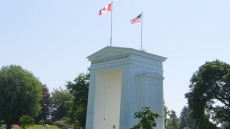TORONTO — The popular view that the relationship between the Conservative government under Stephen Harper and the Supreme Court of Canada was especially hostile appears to be misguided, a new study concludes.
At the same time, the analysis — to be published in the Osgoode Hall Law Journal — finds the now former government was less willing to be completely deferential to the high court than its predecessors.
The popular storyline, according to author Christopher Manfredi, took hold after the court handed the government a series of high profile losses in constitutional cases.
"In some versions of the narrative, these losses suggest that the court has become an explicitly, and even self-consciously, oppositional force against the (Conservative) government's 'extremist' policies," Manfredi writes.
"In other versions...it is a personal conflict between the prime minister and the chief justice."
In fact, the Conservative government's record on charter cases was not much different from its two post-charter predecessors, who also lost big cases, the study concludes.
To test the prevailing wisdom, the political science professor at McGill University looked at cases in which the Supreme Court nixed legislation as unconstitutional, gave an opinion when the government asked for one, and ruled on aboriginal rights and the controversial gun registry.

In late 2013, for example, the top court upended Canada's prostitution laws as a Charter of Rights violation. The following March, the court nixed Harper's appointment of Justice Marc Nadon to its ranks and ruled that changing its composition required a constitutional amendment. Following the setbacks, Harper at one point accused the chief justice of having somehow acted improperly.
"The government’s own reaction to some of these losses added plausibility to the narrative and suggested that any animosity might be mutual," the author writes.
However, trying to draw straight lines between the court's constitutional rulings and relations between the government and court is far from straightforward. For one thing, the paper finds that three-quarters of the Conservatives' charter losses came in relation to measures taken by a previous government.
"You can't really draw conclusions about the relationship between the court and any particular government simply by adding up the wins and losses," Manfredi said in an interview Wednesday from Montreal.
What does appear to be clear, according to his analysis, is that the Harper government adopted a "more consistently confrontational approach" in its legislative responses to court decisions compared to its predecessors. As such, the Conservatives appeared determined to tackle the court head on, paving the way for "sharper conflict," the paper states.

"Previous governments would simply accept the court as having the last word on the meaning of rights," Manfredi said. "The Harper government did not take that point of view."
The case of former Guantanamo Bay inmate Omar Khadr illustrates the points: The high court ruled twice under the Conservatives that Canada had violated his constitutional rights — but both violations had occurred under the former Liberal government.
Even though the Conservative government was not responsible for breaching Khadr's rights, it did failed to mitigate the harm, the paper states.
"Its (non)response to the court's 2010 declaration demonstrated its disagreement with how the court had handled the case."
Manfredi does note the courts are still dealing with Harper government laws and policies. Depending on which way the judicial chips fall, differences from other governments may become more pronounced.
Further research, he suggests, should also look at whether the Conservatives, who were defeated by Justin Trudeau's Liberals last fall, changed the government's litigation approach to cases it inherited.




